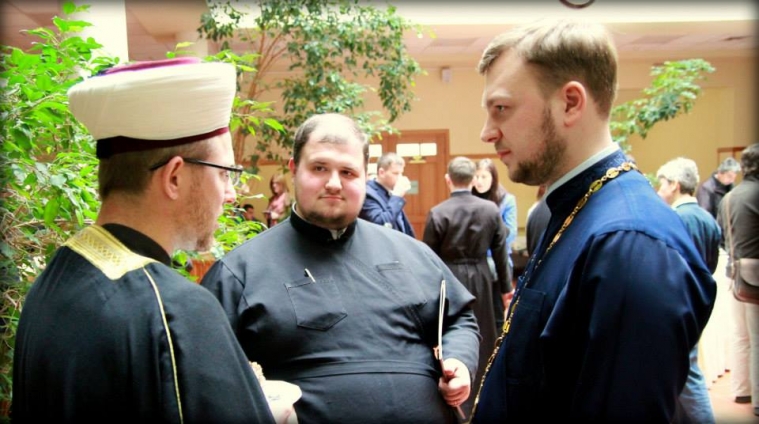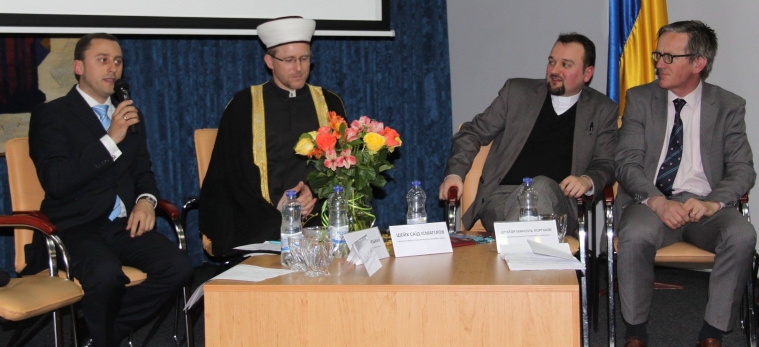Latest events clearly demonstrated that Ukraine in not only a Christian State, but Muslim as well. Understanding of this concept has always been only a statistical figure; but today people of different confessions unite and cooperate as never before in order to provide peace and welfare for our common Homeland.
This includes holding joint Christian-Muslim events, such as International Conference on Christian-Muslim Dialogue and the 50-th Anniversary of Nostra Aetate (Latin: “In our Age”, Declaration on the Relation of the Church with Non-Christian Religions of the Second Vatican Council), facilitated by the Center For Interconfessional And Interreligious Dialogue “Libertas”, was held in Lviv on April 9. Mufti of RAMU “Umma” Mr.Said Ismagilov was among the speakers, and the Crimean Tatars who found refuge in Lviv after the Crimea’s Russian occupation — among the audience.
Growing Interest For Ukrainian Muslims
Shaikh said noted that the compatriots finally realised Muslims as an integral part of the Ukrainian Nation — united by the common national idea rather than common ancestors. Muslims were active participants of the Maidan and all the interconfessional prayer marathons. People who had a stereotyped image of Islam and its followers, started asking questions about the real principles of this religion.
Self-organized Library of Maidan had a constant demand for copies of Qur’an, and representatives of the Muslim communities were always got red carpet treatment at public discussions.
The second, much more massive, wave of interest to Islam rose during the Crimean Crisis, when the Crimean Tatars appeared to be perhaps the greatest Ukrainian patriots on the peninsula.
Nostra Aetate
Dr.Marcel Portheis, Faculty of Theology Professor at Tilburg University (Netherlands) introduced the principles of Nostra Aetate (Latin: In our Age) — Declaration on the Relation of the Church with Non-Christian Religions of the Second Vatican Council of 1962-1965.
In this document the Church officially declared its respect for other religions and importance of interfaith dialogue. It says that “In the course of centuries, however, not a few quarrels and hostilities have arisen between Christians and Muslims. Hence this Sacred Synod urges all not only to forget the past but also to work honestly for mutual understanding and to further as well as guard together social justice, all moral goods, especially peace and freedom, so that all of humanity may benefit from their endeavor.”
The Professor accentuated that Muslims and Christians have much in common not only in their morals, but in their beliefs as well, namely acknowledging existence of One God and need of every human being for having connection with Him, self-purifying by the means of prayers, fasting and good deeds, necessity of studying their Holy Books and attending their chapels at least once a week. Dr.Portheis called upon the believers of these two religions to a more intense mutual introduction which would lead to a better understanding and a more productive cooperation.
Crimean Reality
Mr. Aider Bulatov, Head of Crimean Scientific Centre for Islamic Studies, gave a thoughtful analysis of interfaith relations between the Christians (mostly Orthodox) and the Muslims of the peninsula. He not only described these relations through all of the years of Ukraine’s independence and problems that both confessions faced,, but also tried to make as detailed analysis of the current situation in Crimea as possible.
It is difficult, of course, to predict the future events theoretically, but getting first-hand information and learning about the Crimean believers’ everyday worries, hopes, and fears was interesting for the audience.
"Marylogy"
Mr. Roman Nazarenko, doctoral student at Tilburg University (Netherlands) and our compatriot, impressed the audience with his speech. This mister holds himself out as a specialist in “Marylogy”: he studies the Virgin Mary’s personality within Islamic tradition.
This study is very important both for Christians (only a few of them are aware of the real Muslims’ attitude towards Jesus Christ and his mother) and for Muslims, who’ve been trying to tell about their real attitude towards Mary, who’s is mentioned in the Holy Qur’an as the best of the women who ever lived and will live until the Day of Judgement, for many years. Now the Muslims have hope that their voices, supported by the one of a catholic theologian’s, will finally be heard and this misunderstanding will finally be over.




